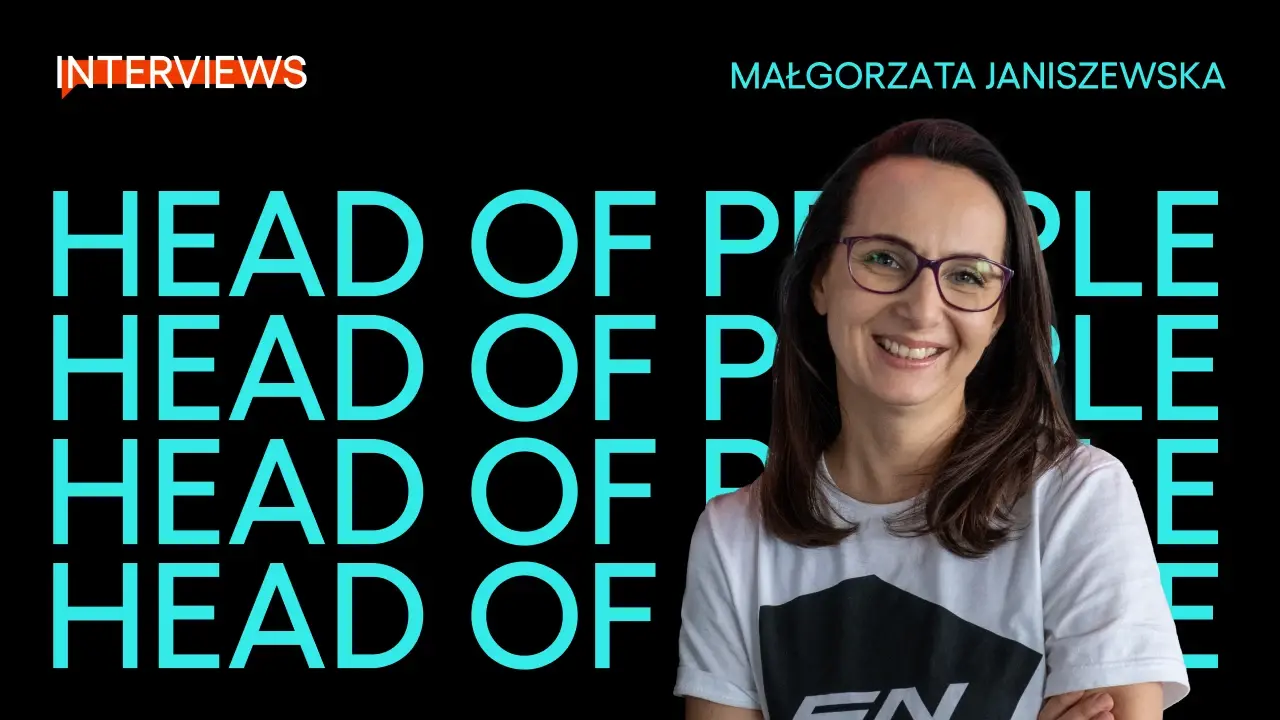#TeamSpeednet: Małgorzata, Head of People


Gosia began her journey at Speednet almost 13 years ago. Today, she plays a vital role in the company’s structure as Head of People. She shared her insights on the changes in HR’s role within the company and discussed upcoming projects aimed at further improving work standards at Speednet.
Hi Gosia, how long have you been working at Speednet, and what is your role?
Gosia: In June, I will be celebrating my 13th work anniversary at Speednet, which deviates from my initial agreement with Tomek and Piotr, as we had agreed on just six months [laughs]. I underestimated how long my journey here would last.
What do I do? It depends on which year you’re asking about. If we were to summarize 2023, I focused on leveraging the business slowdown. We used this time to automate and scale employee-related processes. This way, we were prepared for when the trend reversed to capitalize on emerging business opportunities fully and thereby quickly onboard and integrate new people.
The results of these efforts will be visible in June when we hand over HRapp to #TeamSpeednet. This will significantly simplify and automate the onboarding and offboarding processes. It will also streamline the promotion process. Make it easier for every employee to access their employment documents, and aggregate all employee-related information in one place. This is a custom solution that fits our team’s needs quite well (fingers crossed).
If you’re asking about 2024, the theme is employee experience. For example, a little over a year ago, most performance reviews were handled by one person. Which naturally became very inefficient and limiting over time. However, every employee was treated in the same way, having a similar employee experience. The responsibility for performance reviews has been shifted to Project and Delivery Managers, creating a “risk” that employee experiences in this area might change considerably. This year, we are working on standardizing performance reviews, which involve introducing outcome-based responsibilities for each position in the company.
Could you elaborate on that thought? What exactly do you mean by “outcome-based responsibilities”?
Gosia: Sure. In many companies, people receive job descriptions that focus on the tasks they are expected to perform. With outcome-based responsibilities, however, the emphasis shifts from the methods to the results and achievements of their work. Employees operating under Outcome-Based Responsibilities (OBR) find it easier to focus on achieving the expected results rather than filling an 8-hour day with tasks that may stem from the job description but might not necessarily contribute to the desired outcomes.
I’ll explain this with an example. Suppose we are a Housing Community that wants clean staircases, so we hire a cleaning company. Then, the company begins cleaning. Every morning, when you go to work, the intense scent of floor cleaner immediately hits you, and it’s so wet that you have to be careful not to slip. It’s evident that cleaning has been done, but we wanted a different result.
We call the cleaning company and say: We can’t function like this! Every morning, I fight for my life; I don’t know what’s worse: the smell or the water on the floor!? The man responds: But what are you talking about?! We agreed to clean, and Mr. Adam cleans all the wet staircases daily.
This is an example of focusing on performing duties rather than the result. I need a clean staircase, and I don’t need daily “proof” that the work has been done. Since most residents use the elevator, not the stairs, cleaning the elevator and the entrances to the apartments daily would be sufficient. As would washing the stairs, for example, twice a week.
We are now returning to Speednet’s case. We aim for every employee to know exactly what results are expected of them. But we leave the method of achieving those results up to them. Outcome-based responsibilities will be a common denominator for employee discussions and Project and Delivery Managers.
I assume that after such a long statement, you’re no longer interested in what I did in the year 2022 [laughs].
Then tell us how it happened that you were supposed to stay six months and are about to start your 13th year at Speednet?
Gosia: When I went for the interview at Speednet, I already had another job offer, but the girl at the recruitment agency asked me to attend the interview anyway. When you already have another offer in hand, you can afford to be frank in the interview. That’s exactly what happened. I told the guys that I planned to check out life in Australia in six months, and Piotr and Tomek really liked that arrangement. They had never had an HR position at Speednet before and weren’t sure if they were ready for one yet. I also remember criticizing the company’s current website, which, as it turned out later, they were quite pleased with. Additionally, I critiqued some of their HR and recruitment ideas, and, of course, I proposed an exorbitant rate [laughs].
This honesty from the start set the tone for my relationship with Tomek and Piotr. Once at a company party, Piotr Grodzki, also known as the Chaos Man, got stuck in a loop constantly asking: Why did you stay with us? Why don’t you leave? I remember the next day, I started thinking more deeply about it and replied to him that I stay at Speednet for three reasons:
- I can be myself. I can say what I want to say, and I don’t have to play games or schemes.
- I offer people jobs that bring value to their lives, and I’m not selling a dud.
- I don’t have to spend my time, which I value greatly, on doing unnecessary and senseless tasks that boil down to just twiddling my thumbs.
I still have this message saved. The next day, I got a raise 😊
Do you think that honesty and authenticity have been important during your lengthy tenure at Speednet?
Gosia: Honesty, authenticity, and TEAM. I should probably say that I built this amazing team myself, but I must admit that I have been exceptionally lucky with people. Just like Piotr and Tomek were lucky to have stumbled upon me [laughs].
I don’t know if you know this, but my first employee, actually an intern, was Karolina Zarusińska. Who also came to Speednet “just for a while” to organize the CV database over the summer, and seven years later, she is the Head of Employer Branding. Karolina is the perfect example of something I often say: Your position at Speednet depends solely on you. If you have an appetite for more, the highway is wide open, with no speed limits, but you’re the one driving.
Today, thanks to Asia, Marta, and Maciek in my current team, everything always works smoothly. I especially value their resourcefulness, honesty, and the ability to not take themselves too seriously. Recently, Zosia joined our team, and I can already see that she is also a strong player. I know it sounds almost ridiculous, but my favourite day of the week is Monday. I just love these crazy folks!
Well, please tell us how the role of HR has changed over the years from a small company with 50 people on board to over 200 people.
Gosia: We are definitely becoming more professional year by year. Sometimes, when I see how much there is still to do, I just want to pull my hair out and feel overwhelmed. However, I have learned to remind myself of where we were organizationally a year or two ago. That instantly lifts my spirits. I realize that despite the considerable effort from the support departments in communicating and showing employees the business perspective, explaining what actions we are taking, why we are taking them, and why it is time-consuming. Many people may feel that we are doing too little, too slowly… or the opposite. Some employees would prefer that we didn’t change at all. In summary, it is easier to satisfy 50 people than 200, but the larger the organization, the more professional we become. And the more competitive we are, which in turn leads to increased job stability.
What is your favourite Speednet-related story? What is your best memory?
Gosia: I have countless memories related to Speednet, but they are like photos from college days – not suitable for publication. It’s a pity because just thinking about those memories brings tears of laughter to my eyes. I can hardly believe that they happened. I’m sure that in the years to come, I will miss the dynamics of the relationships between people. It’s hard to explain to someone outside the company, but it’s truly something special.
I can confidently say that at Speednet there is such an institution as an HR couch, will you tell us what it is about?
Gosia: It’s nothing spectacular, but it’s a well-used piece of furniture. In our room, there’s a sofa, and people sometimes come here to drink coffee in complete silence, admiring the view of the bay. Sometimes, someone will lie down, and we say: take a nap, rest. Almost always, the reply is: no, no, I’m just here for a moment… Often, by then, we know that soon we’ll be covering them with a blanket and placing a pillow under their head. Sometimes, someone comes to complain; sometimes, they need to cry or recover from a company party.
Moving on to the last question, what do you think sets Speednet apart from other companies?
Gosia: It’s a difficult question. I’ve been here so long that I’m losing perspective. Some things I already take for granted, as obvious. But conversations with “new” employees bring me back down to earth and it turns out that this open communication, transparency, and the atmosphere at Speednet are exceptional.




